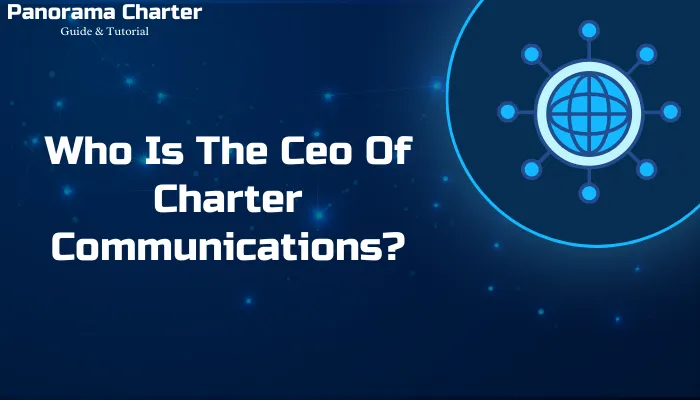Giants in the telecom industry, such as Charter Communications, have a significant impact on how we connect and obtain information in the always changing world. However, have you ever questioned who runs these enormous corporations?
We’ll focus on Who Is The CEO Of Charter Communications? Discussing not just the person who wears this esteemed title, but also the importance of leadership in the larger context of the organization.
This piece functions as a thorough manual, giving you knowledge about:
- The leadership structure of Charter Communications, describing the CEO’s responsibilities and how they affect the company’s direction; * The current CEO of Charter Communications and their history.
- The significance of a capable CEO in steering a company’s strategy and success.
So fasten your seatbelts and get ready to tackle Charter Communications’ leadership environment!

Who Is The CEO Of Charter Communications?
Christopher L. Winfrey is the esteemed CEO of Charter Communications as of right now. He brought a plethora of expertise to this leadership position, having held positions as Chief Operating Officer and Chief Financial Officer of Charter for more than ten years, respectively, when he took over in December 2022.
It’s helpful to know the CEO’s history, since it illuminates the abilities and viewpoint they provide. Given his wealth of financial knowledge, Winfrey is in a good position to handle the intricate financial environment of a sizable company such as Charter Communications.
The Harmony of Leadership: Hierarchy and Structure
After getting to know the CEO, let’s examine Charter Communications’ larger executive team. A cohesive team is essential to the operation of any business, and Charter is no different.
- Executive Team: In addition to the CEO, Charter has a group of seasoned executives in charge of several important areas of the business’s operations. Usually, this team consists of executives from the finance, marketing, technology, and customer support divisions.
- The role of the CEO: At the head of this executive group is the CEO, who sets strategic direction and guarantees departmental alignment. In the end, they bear the blame for the success and general performance of the business.
- Determining the Path: Setting the company’s direction and creating a winning strategy require effective CEO leadership. In a competitive market, Charter’s future course is largely determined by the CEO’s vision and capacity to inspire and lead the executive team.
The CEOs Who Shaped Charter Communications
The largest cable operator in the US and a titan of the telecom industry, Charter Communications, has a long history of innovative CEOs that guided the business to its current prosperity. This section takes a historical look at the notable accomplishments made by the former CEOs of Charter Communications.
A. Early Leaders and Founders: Establishing the Foundation
- Charter Communications: A History
Retired cable business veterans from St. Louis, Missouri, created Charter Communications in 1993. The future expansion of the firm was made possible by these pioneers. - [Initial Leadership:]
Regretfully, it’s difficult to get particular information on the CEOs of Charter throughout its early years. It is important to remember the contributions made by these early leaders, nevertheless. They made important choices on the establishment of the company’s basic beliefs, network infrastructure development, and early market acquisitions.
B. Prominent CEOs Throughout the Company’s History: Creating the Outlook
- Leadership via Development:
A number of CEOs were instrumental in determining the direction of Charter Communications as it grew. Though details on a few may be few, their contributions cannot be disputed. Investigating these executives can provide important details about the company’s growth path.
The following CEOs are instances that may be worth looking into further:
- Find CEOs who managed the introduction of new services or technical innovations. Search for those who guided Charter through major acquisitions or mergers. Leaders in research who guided the organization through difficult times due to regulations or the economy.
Through a closer examination of the individual accomplishments of these former CEOs, you can create a more thorough historical overview of Charter.
C. What They Gave and How It Affected Charter Communications
Every CEO who has headed Charter Communications has made an impact on the business. Examine the following elements to determine their significance:
- Decisions of Strategy:
During their tenure, which significant collaborations, acquisitions, or service launches were made? What effects did these choices have on Charter’s clientele and place in the market? - Innovations in Technology:
Was the CEO in charge of introducing new technology like high-speed internet or digital cable? How did the company’s offers and customer experience change as a result of these advancements? - Credit Situation:
How did the business fare financially under their direction? Did they hit any noteworthy benchmarks for profitability or sales growth? - Business Ethos:
Has the CEO created a unique corporate culture? How did their style of leadership affect the engagement and morale of their staff?
You may write an engaging story that emphasizes the long-lasting influence of the former CEOs of Charter Communication by looking at these variables.
A framework for examining Charter Communications’ history of leadership is provided in this section. Additional investigation will shed light on the particular contributions made by these former executives and their long-term influence on the company’s course.
Tom Rutledge: The Modern Charter Communications’ Architect
As the current CEO of Charter Communications, Tom Rutledge is carrying on the tradition of previous leaders and has been instrumental in transforming the organization into the market leader it is today. Let’s examine his history, management style, and the highlights of his term in more detail.
A. Background and Professional Development: A Route to Leadership
- A seasoned leader in the industry:
Prior to joining Charter Communications, Tom Rutledge had a long career in the telecommunications sector. Examining his prior positions and achievements might provide his leadership style an important perspective. - The Road to Charter: Examine Rutledge’s professional trajectory prior to his hiring as CEO of Charter. This might include any relevant roles he had or his tenure at Cable vision.
B. Charter Communications CEO Appointment: Taking the Helm
- The Shift Year:
Tom Rutledge became the CEO of Charter Communications at the end of 2012. Examine the circumstances leading up to this appointment. Did the business at the time have any particular opportunities or challenges? - Future Perspective:
When Rutledge became CEO of Charter Communications, did he set any clear objectives or ambitions for the company? Gaining insight from his original concept might help evaluate his accomplishments.
C. Approach and Style of Leadership: Piloting the Ship
- A Leader’s Conviction:
Charter Communications has been greatly affected by Tom Rutledge’s management style. Examine and talk about his methods for handling personnel, making decisions, and managing teams. - Pay Attention to Customer Satisfaction and Efficiency:
Rutledge is renowned for placing a high value on client happiness and operational effectiveness. Examine the implications for his leadership style and the company’s policy.
D. Tenure-Related Achievements and Difficulties: Creating a Legacy
- A Transformational Decade:
Tom Rutledge has led Charter Communications through a time of notable expansion and change since assuming the company’s leadership in 2012. List a few of the company’s major accomplishments during his leadership.- Acquisitions and Mergers: Look up and talk about any significant mergers or acquisitions that were overseen by Rutledge, such the 2016 purchase of Time Warner Cable. Examine how these transactions affect Charter’s position in the market and services it offers.
- Financial Performance: Examine the financial results of Charter Communication during Rutledge’s tenure. Has the business seen a notable increase in revenue or profitability?
- Technological Developments: Did Rutledge supervise the introduction of any new technology or service improvements that improved the clientele’s experience? Look up and talk about any innovations that happened while he was there.
- Customer Satisfaction: Has Rutledge’s leadership placed an emphasis on raising customer satisfaction levels? Examine any actions or modifications made to accomplish this aim.
- Difficulties & Roadblocks:
Every leadership path has challenges. Talk about any major obstacles that Charter Communications encountered while Rutledge was in charge. These could include modifications to regulations, hiccups in technology, or shifts in the market.
You can get a complete understanding of Tom Rutledge’s influence on Charter Communications by looking at these areas of his leadership. His foresight, astute choices, and emphasis on productivity surely helped to mold the business into the telecom behemoth it is today.
Conclusion
To sum up, Who Is The CEO Of Charter Communications? The CEO of Charter Communications, as of my last update in January 2022, is Thomas M. Rutledge. He has been at the helm of the company since 2012, guiding its growth and development in the telecommunications industry. Rutledge’s leadership has been instrumental in Charter’s evolution into one of the leading providers of internet, cable TV, and phone services in the United States.
